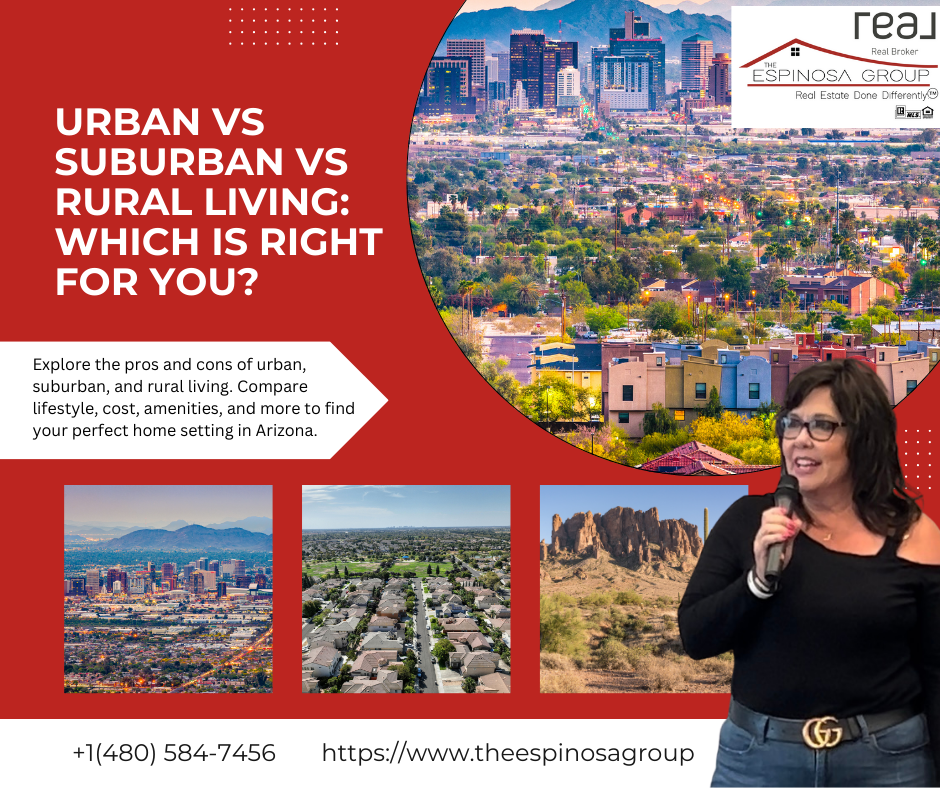Urban vs Suburban vs Rural Living: Which Is Right for You?
How to Decide Between Urban, Suburban, and Rural Living
Choosing where to live is a big decision that impacts your daily lifestyle, budget, and long-term happiness. Whether you’re drawn to the buzz of the city, the balance of suburban neighborhoods, or the tranquility of rural areas, each setting offers unique pros and cons. Here’s a breakdown of urban, suburban, and rural living to help you decide which is best for you.
Urban Living: The Heart of the City
Pros:
- Convenience: Cities offer close proximity to work, entertainment, restaurants, and cultural events. Public transportation is often well-developed, reducing the need for a car.
- Job Opportunities: Urban areas tend to have diverse industries and higher concentrations of employers, making it easier to find jobs or switch careers.
- Social Life: With plenty of social venues, activities, and events, city living is ideal for people who thrive on connection and activity.
Cons:
- Cost of Living: Urban areas often come with higher property prices, rents, and living expenses.
- Limited Space: Homes and apartments are smaller, and outdoor space is minimal or nonexistent.
- Noise and Crowds: Traffic, construction, and large populations can lead to sensory overload for some people.
Who It’s Best For:
Young professionals, singles, and those who prioritize convenience, cultural opportunities, and an active social life.
Suburban Living: The Best of Both Worlds
Pros:
- Space: Suburban homes often come with larger yards, multiple bedrooms, and ample storage space.
- Family-Friendly: Suburbs are known for good schools, safe neighborhoods, and kid-friendly amenities like parks and community centers.
- Community Feel: Suburban areas often have a tight-knit community with events and social gatherings.
Cons:
- Commute Times: Suburban living usually requires commuting to work, which can be time-consuming depending on traffic and distance.
- Car Dependence: Public transportation options are often limited, making a car a necessity.
- Limited Nightlife: While suburbs are quieter, they often lack the nightlife and cultural attractions of cities.
Who It’s Best For:
Families, couples, and individuals looking for more space, a quieter environment, and a community-oriented lifestyle.
Rural Living: Peace and Privacy
Pros:
- Affordability: Rural areas often have lower property prices and taxes, making it easier to afford larger lots or unique homes.
- Natural Beauty: Living in the countryside means enjoying scenic views, open spaces, and a closer connection to nature.
- Privacy and Tranquility: With fewer neighbors and less traffic, rural areas offer unmatched peace and quiet.
Cons:
- Limited Amenities: Access to shopping, healthcare, and entertainment may require long drives.
- Internet and Services: High-speed internet and reliable services can be less available in remote areas.
- Isolation: Rural living can feel lonely for some, especially those used to a bustling environment.
Who It’s Best For:
Nature lovers, retirees, and those seeking privacy, self-sufficiency, or a slower pace of life.
Key Considerations When Choosing Your Ideal Setting
1. Lifestyle Goals:
- Do you prefer a fast-paced lifestyle or a quiet retreat?
- Are cultural events, nightlife, and restaurants a priority?
2. Property Preferences:
- How much space do you need?
- Do you want a yard, garden, or acreage?
3. Commute and Accessibility:
- How far are you willing to travel for work, school, or essential services?
- Is access to public transportation important?
4. Budget:
- What can you afford in terms of housing costs, taxes, and utilities?
- Are you prepared for potential maintenance costs, such as larger rural properties or older urban homes?
5. Long-Term Plans:
- Are you planning to grow your family, start a business, or retire soon?
- Will your current choice support your future goals?
Conclusion
Deciding between urban, suburban, or rural living comes down to your lifestyle, priorities, and budget. By evaluating what matters most to you—whether it’s convenience, community, or solitude—you can find a location that feels like home.
Need expert advice on finding the right property in Arizona? Reach out to The Espinosa Group for personalized guidance tailored to your lifestyle and goals.
Categories
- All Blogs (225)
- Contracts, Negotiations & Process (4)
- Home Buying Process (19)
- Home Buying, Selling, and Investing Tips (65)
- how to buy a house (9)
- How to sell your house (11)
- Importance of a Real Estate Agent (1)
- real estate investment strategies (14)
- Real estate Market in Arizona (7)
- ROI tips (14)
- Selling a home (19)
- STAGING DIFFERENTLY (37)
- Staging tips for selling (23)
- THE AGENT (5)
Recent Posts













